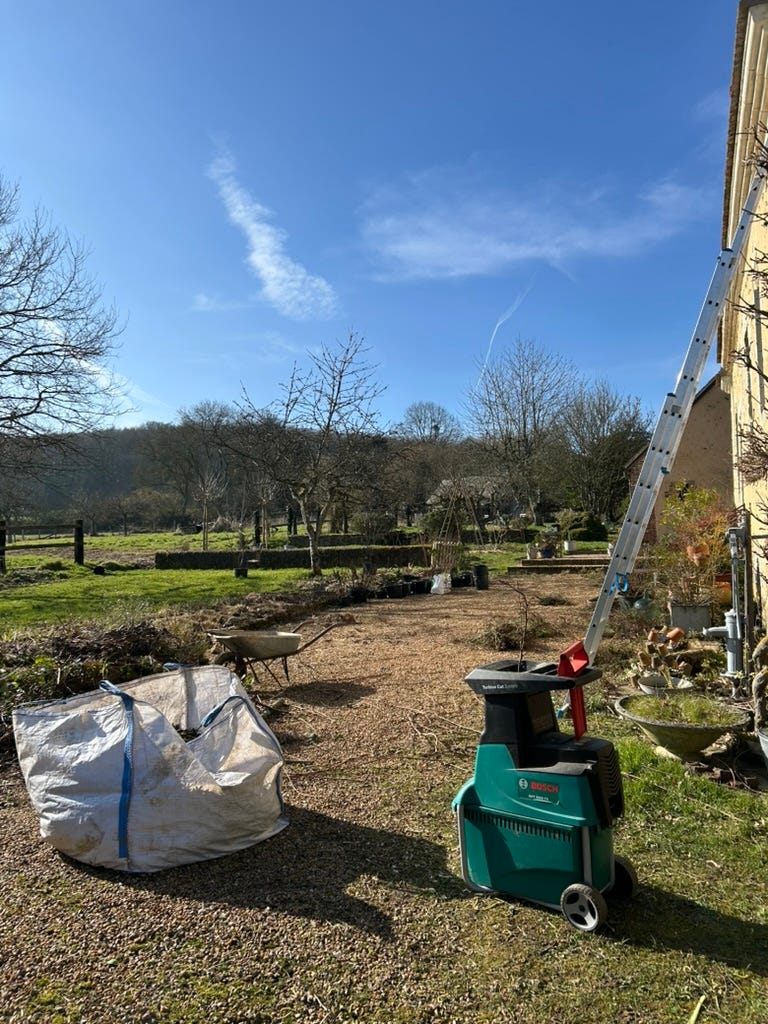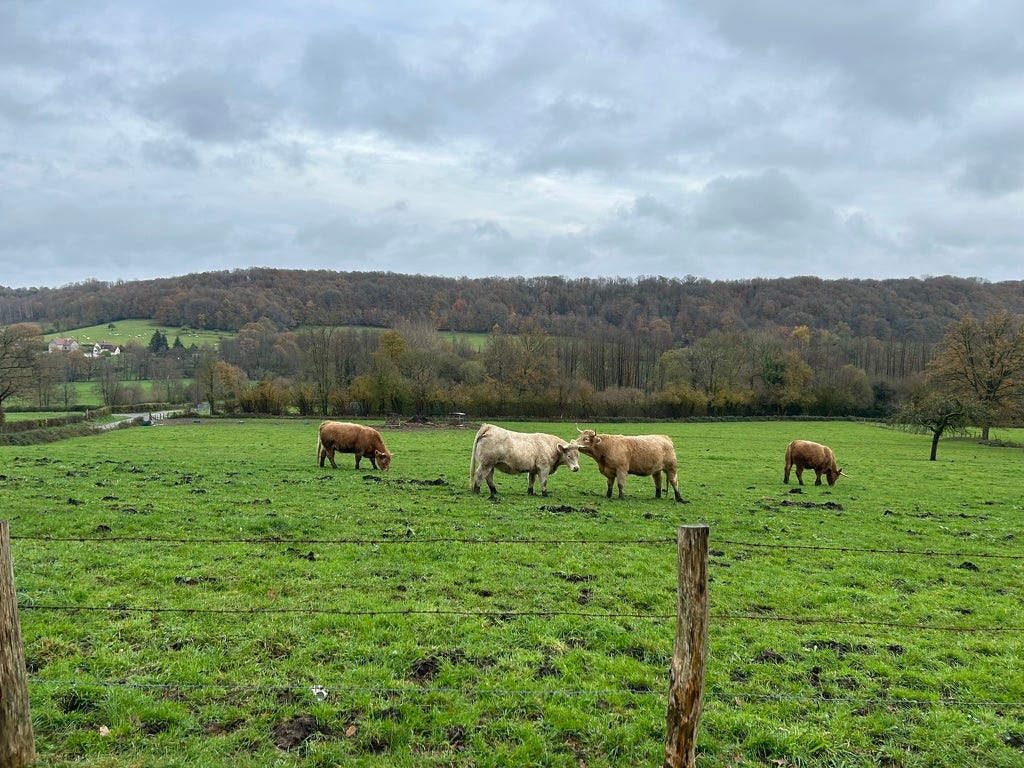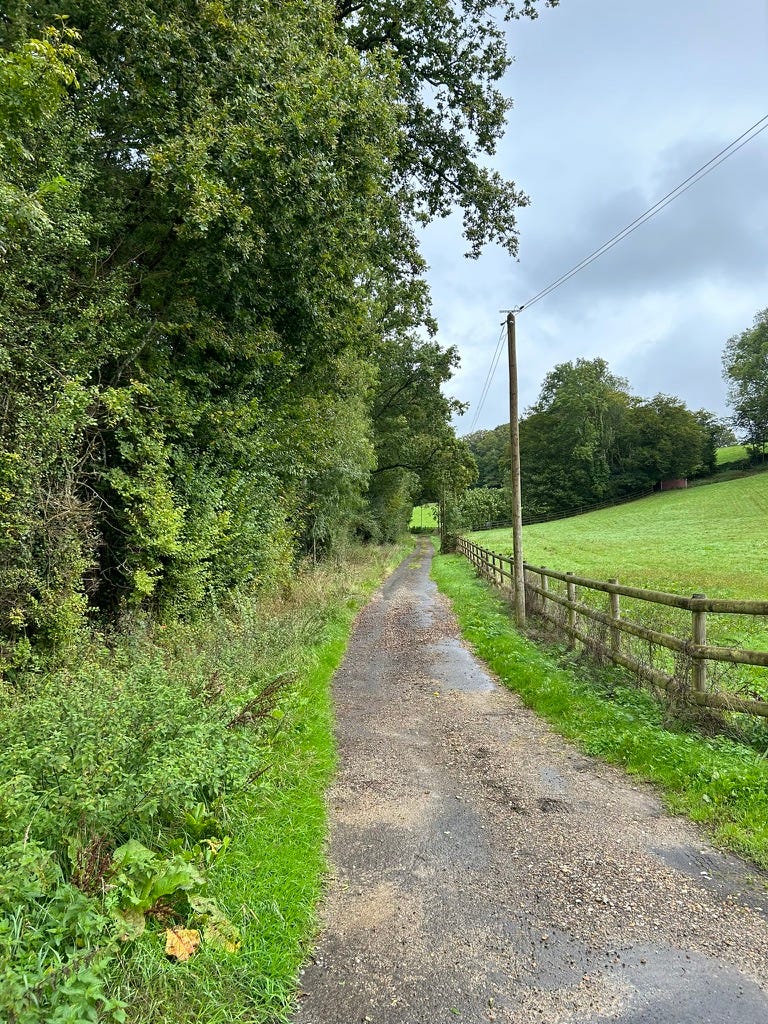Two Roads Converged in a Village
Saint-Maxime is a strange magnet, with opposing poles and a strong force of attraction.

The last time I attended a village-wide meeting, in January, I was struck once again by the two tracks of residents in Saint-Maxime. There are the zippy ones, mostly younger, with roots in Paris (my team), and there are the much older folks who are native to the region. Except in moments like village-wide meetings, we do not mix. I assume they see us as arriviste gentrifiers with big city values fucking up the real estate stock. And we see them either as ineffable, unknowable, and resentful towards us, or as undifferentiated parts of the landscape who tend to the animals we eat and till the fields we drive past and sigh at. We are ships trying not to pass in the night.
The subject of that January meeting was “New Year’s wishes,” but what it really meant was a status report on town infrastructure delivered by our low-energy mayor. It was the first time I was in a room that was overwhelmingly populated by old-head Saint-Maxime natives and when I clomped in in unseasonable white flowered clogs, you could have heard a pin drop. The mayor was at the front of the room, swaddled in a long puffer coat, her pockets overflowing with crumpled Kleenex. She sighed out updates on small-bore urbanism projects that would have to wait until her replacement comes in 2026. She was fighting a cold, as were over half the people in that stuffy, sticky space, and I have never seen someone more done with her own job.
While I remain touchy about proximity to anyone visibly sick thanks to the pandemic, the intensity of my desire to claw my way out of that room was not simply due to the soundtrack of unmasked sniffles and coughs. I suppose as long as it doesn’t degenerate into open conflict, this rural French version of the Sharks and the Jets is what it is. As we are ever more capable of creating unpierceable psychic bubbles, we can live in the same tiny town and essentially not know each other at all. That is a certain kind of freedom.
There is an opposite phenomenon here, which is the bizarre neighbor-serendipity I’ve mentioned before. If one pole of Saint-Maxime life is blanking half the people who live across the street, the other pole is random new people showing up in your life, and it’s like you knew them all along. That’s how I felt about Michel and Simon, about Cassandre and Jean-Yves, about Tom and Callahan, and now, Patty, who moved in last summer.
Patty is a 72-year-old corporate facilitator amicably divorced from a Socialist politician turned cheeky sometime-talking head. She is a dual citizen now, but as New England as it gets, down to the accent, pastel polar fleece vest, plaid flannel shirts and I-cut-it-myself silvery hairdo. When the realtor showed her the house she ended up buying as a weekend place, one door down from Angélique, across the street from me, she told her, “And there’s another American right there over there!” Apparently that was a selling point, and I’m glad it was because Patty is a banging new addition to our crew.
Like I did, she attempted a “Hi, I’m new here!” party, and hers was smartly not timed to the Fête de Village. But she asked the mayor’s advice on whom to invite, and so when I bopped in there with Michel and Simon (whom I folded in without asking, to Patty’s delight), it was the January meeting all over again. Old heads galore and not a lot of outstretched hands for introductions. Patty’s three kids were there, all adults who grew up in Paris and Fontainebleau, but who spoke their mother’s tongue without an accent. They were informal and easygoing like Americans, and had assembled a pretend grocery store for their kids in Patty’s renovated outbuilding that was so crammed with tiny-sized vintage groceries I wanted to play there myself. There was a wooden cash register with a bell. There were coins and bills. There were tiny bins full of tiny plastic oranges and elongated green shapes that must have been celery. Make your lists, kids, the store is open!
When Charles and my brother came for Thanksgiving, Patty was doing the typical American expat thing and having her family dinner the following Saturday, so she popped over to share a plate along with Michel, who was flying solo that week. I think she was the only other person who ate Charles’s water cracker and sausage stuffing, based on his family recipe from Massachusetts. (It must be a New England thing. Since my only religion is don’t experiment on Thanksgiving, I didn’t try it.)
Patty showed herself to be a good listener and a fun storyteller with lots of Yankee charm. She apologized for her housewarming—she wasn’t vibing with the old heads either—and said she was glad to have found us. A few weeks after Thanksgiving, she sent me a text message with a photo of an old friend of mine from Paris I’d lost contact with years ago who, it turned out, has become a good friend of hers.
Two nights ago, Patty and Michel came over for a drink, and she regaled us with her affinity for Carl Jung, whose work I had just completed a marathon immersion in for a ghost writing project. This is meta-on-theme: Jung popularized the notion of synchronicity. Myers-Briggs Personality Typing is a Jung offshoot too, if you didn’t know. We discovered on Thursday that Patty is very into that system. If memory serves, she and Michel are both ENFPs; I am an INFJ. Apparently were are compatible. You don’t say!
Saint-Maxime is starting to feel like low-stakes Twin Peaks.
“Whenever I come out here, I find myself wondering why I’m spending any more time in Paris,” Patty said that night as she was walking out the door. As I was cleaning up the snack plates and empty bottles to get ready for bed, I flashed back to a story Cassandre told me not long after we met.
“People find this place who need to,” she said.
It was 15 years ago, when Cassandre was on the brink of relocating out here. She was living in Versailles then, and had never in her previous 60-something years thought about hunkering down somewhere so rural and removed as Saint-Maxime. But she was searching for a peaceful place to retire and write. Like it was for me, Saint-Maxime would be a radical departure for her. It didn’t make sense, but she just had a feeling about it.
Cassandre decided to take a walk in the surrounding countryside to soak it in and look for a sign. Winding her way out from the center of the village to a pasture near what would become Michel and Simon’s place, she saw a woman walking by herself. She was older than Cassandre was at the time. Simply dressed. Not elegant. Not old money. Not country chic. Strangely, the woman said hello. It wasn’t in the way we give a noncommittal “bonjour” to someone in passing; it was open and welcoming. The woman slowed down, signaling availability. So Cassandre told her she was thinking about moving in.
“There is something good about this place,” the mysterious woman replied. “People find it who need to.”
Cassandre never saw her again. Maybe the lady was simply visiting a friend, and wanted to say something benevolent to another woman at a crossroads. Maybe she was the ur-Old Head, an archetypal apparition, the Spirit of the Place. If so, she was more welcoming than her earthbound compatriots. But then that’s how spirits roll—or so I believe, anyway.
On average, the People Who Need Saint-Maxime tend to be older women. I’ll count myself among them. Jeannette is one. Charlotte the painter also wound up here randomly; she is definitely one. Francine, who took over Jean-André’s dive café in the nearest Big Village with her architect husband, is another. A 50-something chef with a degree from a prestigious cooking school in Paris, she wanted someplace simpler she could anchor into. So she uprooted herself and her family, bought a place just outside the center of Saint-Maxime, gave a light facelift to the restaurant, and then promptly got breast cancer. Her food suffered, though not as much as she did, losing all her hair and most of her energy.
Thankfully, after that existential trial, Francine is now in remission. In fact she looks radiant. (Any day now the food will improve too, right?) Maybe she needed the space and green fields and extra oxygen to get through the illness she didn’t even know she had yet.
Two weeks ago, a graphic designer friend of Michel’s about my age came through, thinking the time had come for her to bail on her life in Bordeaux. She’s flirting with the idea of a gallery space in Saint-Jouin. So we may soon have another one. No idea what radical epiphany or bone-shattering crisis she may be about to gut through or transcend. I hope whatever it is goes as well as it has for the rest of us.
We menopausal imports might just be a happenstance of demographics. Women who are over their childbearing years are said to be unleashed. Free to expand, free to burrow, free to dream up impractical schemes like going Green Acres, free to no longer make calculations around men, who are insanely scarce here.
Except for that last thorny detail, I certainly don’t regret my move. There is something good about this place. I must have needed it.






There must be a few villages like yours. I live in one and often find myself in the company of fellow post-menopausal transplants, all of us loving our lives, except that we wish our partners had taken better care of themselves and were still with us. The been-here-since-forever types are often less well educated than the transplants, surely another reason why we don't mix well. At least there is no open hostility. And often their kids move to the cities, so the increase in housing values is seen as a bonus.
I love this post in so many ways, it’s such a vivid description of the interior lives of you transplants. And miraculously slowed my breathing while I was reading it.